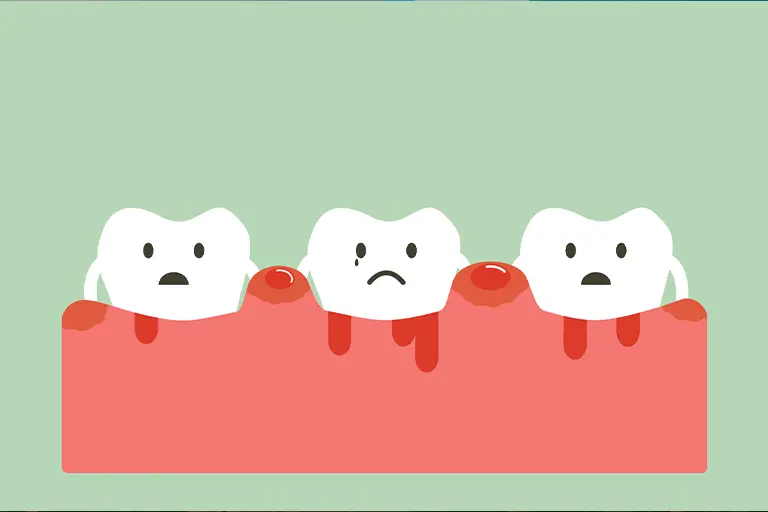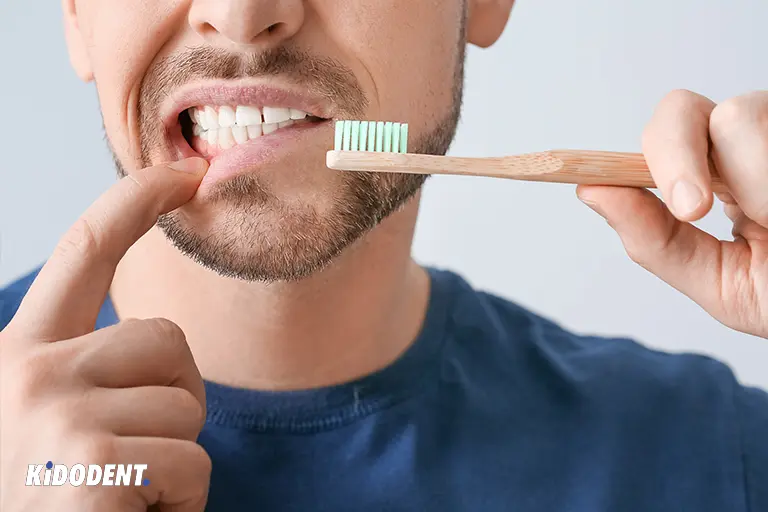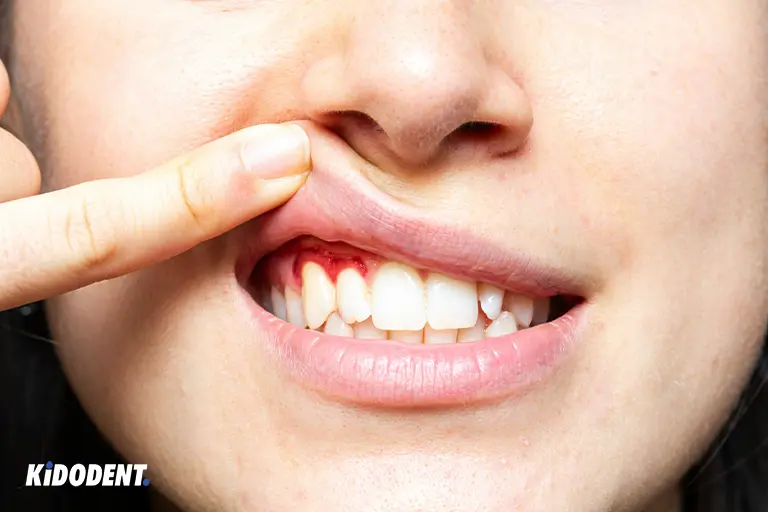What is gingivitis?
Gingivitis (gum disease) is a medical term that refers to the inflammation of the gum (gingiva), which results in red, swollen, and bleeding gum problems. Gingivitis is the mild and early stage of gum disease or periodontal disease. If it is not treated, it advances to much serious gum disease called periodontitis, which leads to tooth loss.
Poor oral health is the most common cause of gingivitis. If you brush your teeth twice a day, floss daily and have your teeth checked by the dentist regularly, you will prevent and even help stop the progression of mild gum disease.
Signs and symptoms
Gingivitis can be chronic or acute and the inflammation can appear in the marginal gum line, interdental gum tissues, or in attached gums areas. If you want to know what it looks like, look for the below signs and symptoms:
- Red and sore gums surrounding teeth
- Inflammation (swelling) in the gums
- Gums that can easily bleed by any provocation (in which you may notice during brushing or flossing)
- Puffy gums, known as gingival hyperplasia
- Dental plaque which is the sticky biofilm on teeth and host bacteria
- Pain and sensitivity in your gums
- Bad breath (halitosis)
- Receding gums which leave the tooth’s roots exposed. Normally, gums are tightly around teeth, but in serious periodontal disease cases, gums tend to pull away from teeth
- Loose teeth
What causes gingivitis?
Poor oral health is the primary cause of gingivitis because it leads to plaque buildup to from on teeth. Plaque is a film layer that adheres to teeth and hosts bacteria. While you are eating or drinking, the bacteria in plaque feed on sugar in your diet and therefore continue to thrive. If accumulated plaque is not removed daily, it then hardens into calculus (tartar). The plaque will occupy the surface of teeth especially the space between teeth and gums (gum line), the interdental spaces and almost any hard-to-reach areas of teeth.
The unremoved plaque buildups cause tooth decay and inflammation in the surrounding gum tissues around teeth. This is when gingivitis begins to appear with swelling, redness, and the changes in form and texture of the gums.
The untreated gingivitis then advances to periodontitis, where pockets of infection begin to form in the underlying gum tissues. Receding gum occurs and the supporting bony structure of the gums is affected and ultimately tooth loss happens. It is important to know the causes and take action quickly for the prevention or treatment of gum disease.

Major causes of gingivitis include:
- Poor oral care.
-
Lack of proper oral hygiene is the most damaging risk factor for gingivitis to develop. Twice a day brushing teeth and flossing daily is the best way to prevent accumulation of plaque. Improper cleaning of gum lines and allowing for plaque to inhibit the space between gums is an even greater risk that you should be aware of.
- Smoking/tobacco use.
-
Smoking habits and using tobacco products, such as chewing tobacco, are contributing factors for periodontal diseases.
- Stress.
-
Having stress will impact the immune system’s reaction toward infections and diseases. That includes infections in the mouth like gum problems. Stress also directly causes some type of gingivitis like necrotizing ulcerative gingivitis.
- Nutritional deficiencies.
-
Vitamin C deficiency is a notable cause of developing gum disease.
- Certain drugs.
-
Medications such as anti-seizure drugs phenytoin (Dilantin), calcium channel blocker drugs, birth control pills, and immunosuppressant drugs are indicated as risk factors for gum condition.
- Hormonal changes.
-
Changes in hormones during pregnancy, puberty and menopause or using oral contraceptives are other gingivitis’ causes.
- Unhygienic and ill-fitting dental appliances.
-
In case you are wearing removable dental appliances, you need to clean them regularly. If your dental appliance doesn’t fit well, and is not cleaned or removed as recommended, risk of fungal development and infections such as denture stomatitis increases. This level of infection will be the contributing risk factor, too.
Other causes are:
- Mouth breathing
- Dry mouth
- Diabetes
- Immunodeficiency diseases such as HIV
- Genetics and hereditary factors
- Aging
- Worn or cracked restorations (e.g., broken filling)
- Viral infections
How is gingivitis diagnosed?
Your dentist can detect if you have gingivitis according to:
- Asking question and checking medical history
- This allows your dentist to know about the other signs and symptoms, the duration, the medications used, and other pre-existing conditions.
- Your symptoms that are present
- This helps your dentist check for plaque buildup, inflammation, bleeding on probing, and deeper pocket measurement around the gums and teeth. These physical examinations are major ways that your dentist can do for gum disease diagnosis.
- X -rays
- This shows the infected underlying gum tissues or the possibility of pocket formation around supporting bones that can be affected.
After diagnosis, your dentist plans for the best treatment. You may be referred to a periodontist, a dentist specializes in treating periodontal diseases (gum diseases), depending on the level or difficulty of treatment.
What are gingivitis treatments?
The best treatment is good oral hygiene. It may sound simple but your dentist’s priority for treating gingivitis is always maintaining oral health and eliminating plaque on teeth.
Based on your conditions, treatments vary. Your gingivitis may be in the early stages, which makes things easier. But in severe cases, your dentist will try more options.
Here are the common treatment options:
1. Professional teeth cleaning
Your dentist arranges an appointment for plaque control measurements. They can perform:
- Teeth scaling to remove plaque and calculus (tartar) residue from the surface of teeth (supragingival)
- Root planing to remove accumulated plaque and calculus from the root surface (subgingival)
- Fluoride therapy or application of fluoride varnish on teeth in order to strengthen teeth and help remineralize tooth enamel
2. Replacement or repair of tooth restoration
If there is a lost, broken and worn-down filling, crown and other form of dental restoration, it is fixed to prevent infections and further damage to teeth and gums.
3. Prescribing medications
In some cases, your dentist may see that oral hygiene is not enough due to increased risks of inflammation and infection that are present. Therefore, your dentist can prescribe:
- Antibiotics to fight bacteria and infections and when progress of the gum disease is likely and seems to be recurring
- Topical antifungal medications which eliminate fungal development
- Antiseptic/antibacterial mouthwashes to try at home as an adjunct to daily oral hygiene practices. These antiseptic mouthwashes contain chlorhexidine or essential oil ingredients.
4. Performing surgeries
In severe form of gingivitis or advanced periodontal diseases (periodontitis), your dentist can recommend surgical operation. The dentist or periodontist can try:
- Surgical excision (gingivectomy) to remove the excessive and affected gum tissues
- Bone and gum graft in which the dentist or periodontist helps receding gums or affected bone tissues to regenerate through the gum grafting or bone grafting
5. Laser therapy
The usage of laser in dentistry has many purposes. For example, in surgical operation for Gingivitis (gum disease) treatments, laser therapy allows dentist to remove the affected gum tissues easier.

How to prevent gingivitis (gum disease)?
- Brush your teeth twice daily
- Floss your teeth every day
- Use fluoride toothpaste to fight plaque and help strengthen teeth
- Limit sugar intake and try healthier diet and lifestyle
- Quit smoking
- Manage your stress
And finally, do not forget to visit your dentist regularly or in case you notice any changes in your gums or if there is the presence of risk factors such as bad breath, redness, swelling, gum sensitivity, medications you take and other conditions. This allows for dentists to take necessary tests and examinations. They are then able to treat the gingivitis easily or reverse the progress of gum disease.
Frequently asked questions
The best way to prevent gum disease is through good oral health. Plaque is the number one culprit for gingivitis, so if you brush your teeth twice daily and floss carefully, you will not allow bacterial plaque to cause inflammation and infection.
Chlorhexidine mouthwashes and essential oil-containing mouthwashes have been indicated as the best anti-gum disease treatments recommended by dentists.
Gingivitis is an inflammatory gum condition that can affect anyone at any age. It may show itself as mild during childhood and exacerbate as we age. It is caused by the accumulation of plaque, but there are other non-plaque forms. People with poor oral hygiene and high rate of plaque buildup are the primary victims.
Also, poor or inappropriate diet (e.g., high sugary diets), smoking habits, hormonal changes (e.g., pregnancy, puberty), mouth breathing, saliva dysfunctions, immune system disorders, and underlying diseases are all risk factors that make people susceptible to gingivitis.
Gingivitis requires professional teeth cleaning methods to remove plaque on teeth. Scaling teeth to scrub away plaque and tartar and root planning are common ways plaque is removed from the surface of teeth and root areas.
After that, it all comes to your oral hygiene practices at home. You should continue to clean your teeth and mouth with daily brushing with fluoridated toothpaste and flossing. If recommended, using antiseptic mouthwashes to reduce inflammation and irritation is a helpful way to make gingivitis’s bacterial activity go away.
Yes, it is and treatment is required. Gingivitis is actually the name for gum inflammation around teeth. If it goes untreated, it can get worse and turn to periodontitis, which leaves serious damage to more gum structures. Pockets of infection are formed in the underlying gum tissues, periodontal ligament, and other supportive bones. This situation results in tooth loss.
